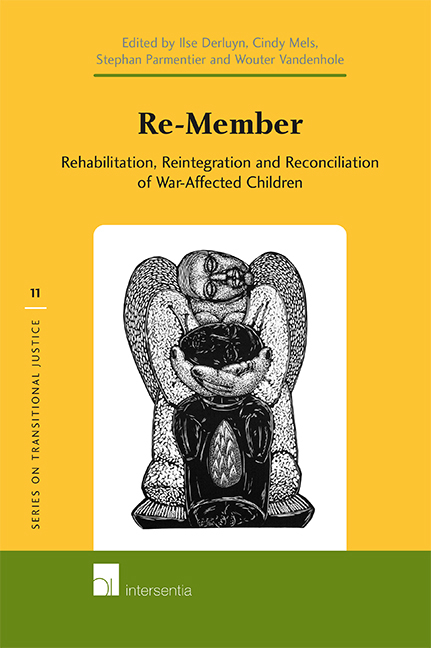Book contents
- Frontmatter
- Preface
- Foreword
- Contents
- Introduction: Children Affected by Armed Conflict at the Intersection of Three Fields of Study
- PART I SETTING THE SCENE: THREE DISCIPLINARY PERSPECTIVES
- PART II LESSONS LEARNT FROM CURRENT PRACTICES AND APPROACHES
- PART III EXPLORING RESOURCES THROUGH EMPIRICAL RESEARCH
- PART IV LOOKING BACK, REACHING FORWARD
- About the Editors
- About the Authors
Preface
Published online by Cambridge University Press: 20 January 2021
- Frontmatter
- Preface
- Foreword
- Contents
- Introduction: Children Affected by Armed Conflict at the Intersection of Three Fields of Study
- PART I SETTING THE SCENE: THREE DISCIPLINARY PERSPECTIVES
- PART II LESSONS LEARNT FROM CURRENT PRACTICES AND APPROACHES
- PART III EXPLORING RESOURCES THROUGH EMPIRICAL RESEARCH
- PART IV LOOKING BACK, REACHING FORWARD
- About the Editors
- About the Authors
Summary
I am pleased to write this preface on the occasion of the publication of the proceedings coming out of the international conference on ‘Rehabilitation and Reintegration of War-Affected Children’, held in Brussels, Belgium, in October 2009.
CHILD SOLDIERS
One important category of children in armed conflict are the many thousands of child soldiers who are recruited and trained to play an important role in the violence. In relation to this category of children, it is worthwhile to draw attention to two major aspects, i.e. the reintegration of these children and the accountability of those who recruit them.
The reintegration of child soldiers has been a complex issue which has tested even the best programmes on the ground. The Paris Principles of 2007 give us the best guidance, as they contain key insights that need implementation and relate to social and economic rights of children, as well as their rehabilitation and reintegration. Three overarching guidelines configure the entire reintegration effort. Firstly, children must be heard and be enabled to participate in all decisions affecting them, so as to ensure that these decisions are taken in their best interest. Some children for example may think that they are wasting their time at school while they want to learn practical skills. Secondly, nondiscrimination is an absolute must in any reintegration programme. It is important that former child soldiers do not receive a preferential treatment over those who have not been associated with armed groups. Also, particular attention should be given to girls, so as to ensure that they are involved in the reintegration effort and to see to it that their specific needs are being met. Thirdly, the capacity of reintegration programmes and the actors involved should be strengthened in order to ensure their self-sustainability.This is particularly important when it comes to schools and hospitals.
Apart from these overarching guidelines, the same Paris Principles also contain four operational principles that must be implemented to strengthen the effectiveness of the programmes geared at reintegrating child soldiers into society.
- Type
- Chapter
- Information
- Re-MemberRehabilitation, Reintegration and Reconciliation of War-Affected Children, pp. v - viiiPublisher: IntersentiaPrint publication year: 2012



